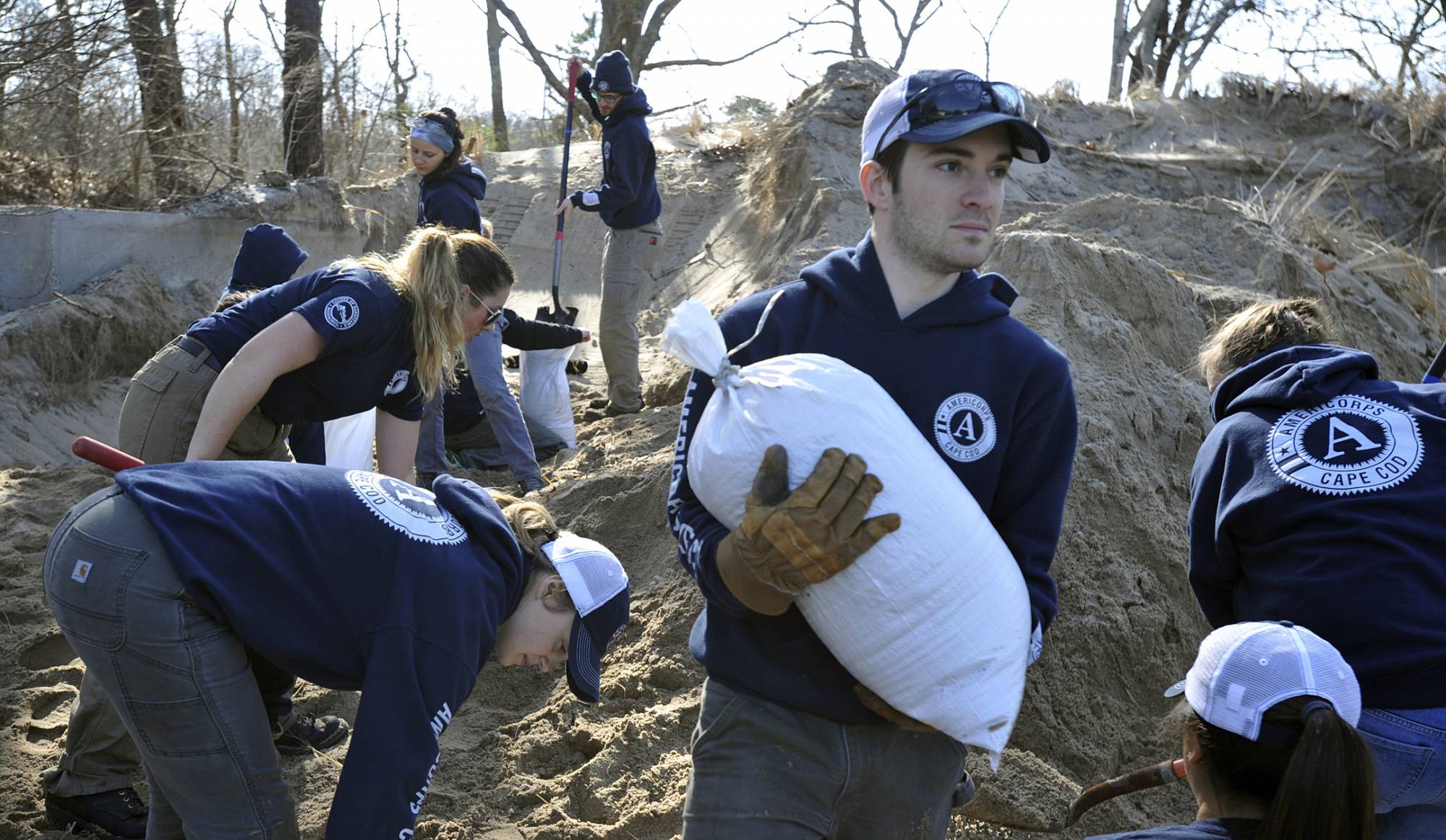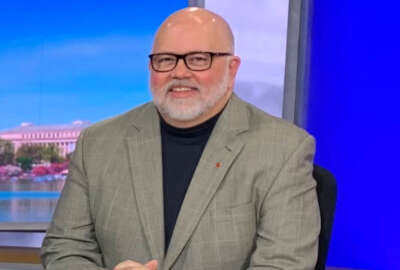
Meet the newest member of a key council influencing how your agency operates
A federal attorney steeped in administrative law now has a chance to influence it. Fernando Laguarda is general counsel at AmeriCorps.
Best listening experience is on Chrome, Firefox or Safari. Subscribe to Federal Drive’s daily audio interviews on Apple Podcasts or PodcastOne.
A federal attorney steeped in administrative law now has a chance to influence it. He’s general counsel at AmeriCorps. He’s also spent years developing and teaching courses on administrative law and government oversight. Now he’s just been appointed a member of the council of the Administrative Conference of the United States. Fernando Laguarda joined the Federal Drive with Tom Temin.
Interview transcript:
Tom Temin: And just a quick detail question. Is being a member of the council a full time job? Or do you get to stay in AmeriCorps? Or how does that work?
Fernando Laguarda: Being a member of the council is not a full time job. It is essentially like being a member of the board of the organization. So I will participate because I haven’t done it yet in council and conference meetings, but I am not a full time employee at ACUS I am a full time employee at AmeriCorps.
Tom Temin: Okay. And we had your new Chief Executive Officer Michael Smith on the show just a few months ago when he was appointed. Let’s talk about administrative law for a minute of all of the branches of law that a lawyer can go into, you could have been an ambulance chaser making millions, you could have done federal procurement and had rich clients that are suing the government. You chose administrative law as a specialty, which to the general public might sound arcane, but what’s the attraction of it?
Fernando Laguarda: Administrative law is what touches the majority of people it’s about the health, safety, welfare and well being of people. Administrative agencies make more law, adjudicate more cases affect more rights, responsibilities, touch on the liberties of Americans, and have potential to contribute so much to our well being that of course, it’s where I want to be because when I decided to go to law school, my question to my mother, who was advising me was does the world need another lawyer? And my mom said, well, the world always needs another good lawyer. And where can you do good, you can do good in a lot of places. But I ended up with a very amazing career doing administrative law in front of the FCC, the FTC, the PTO, the Bureau of Export Administration, the Library of Congress, many agencies realizing how they touch on so many different interesting issues. It’s just been a wonderful career.
Tom Temin: And right now, the Federal Trade Commission, and I believe a couple of other agencies are facing a constitutional Supreme Court challenge to the way they conduct administrative law. And whether it’s constitutional has that come up much in the inquiries you’ve done over the years?
Fernando Laguarda: That hasn’t been the subject matter of a lot of my research the constitutionality of those agencies, I think it’s important for those issues to work through the courts. But my work has been more on the output of the agencies and not their legitimacy.
Tom Temin: All right. And with respect to the output, then administrative law to me seems to have a lot to do with making sure that what Congress has delegated to agencies is done in a fair manner, is that the kind of the animating principle that should be in agency’s minds when they do have great administrative power over many, many aspects of American life and work.
Fernando Laguarda: I think fairness is really important because it touches on the legitimacy of the process, its outcome, the trustworthiness of the process. One of the most important touchstones of my interest in administrative law was a book I read as a practicing lawyer called “Prophets of Regulation’ by Thomas McCraw. I don’t know if you’re familiar with it, but I highly recommend it. McCraw was a business historian at Harvard Business School. And it’s a wonderful book about how the work of administrative agencies is both personal, but also systemic, and the importance of having a vision as to what you’re trying to accomplish, and then trying to be realistic about the tools that you are given. But fairness obviously matters, accessibility, transparency, reducing barriers to participation in a manner that makes it easier for people who are affected, to participate, all very important.
Tom Temin: We’re speaking with Fernando Laguarda, he’s general counsel at AmeriCorps and a new member of the Council of the Administrative Conference of the United States. And that idea of accessibility extends to Americans that might be affected. But not everyone has the means to challenge the government or to even understand its processes the way say corporations do or people with a vested interest in some agency action do and yet they might be affected. And I guess you’ve done some work in that area, too, haven’t you?
Fernando Laguarda: Yeah, I think it’s really important for administrative agencies to think constantly about how their processes, their decision making and their outcomes are accessible to affected parties and then also to the wider community. That we have a tendency to, as a result of our expertise, start to talk in code, and start to think about our outputs as very specialized, but in fact, they are of broad interest. And so we should constantly be thinking about making them easier to understand, being proactive about seeking input from stakeholders, from communities, and reducing barriers constantly, because barriers come into play, they sometimes are just the result of trying to make processes simpler for those who are participating. But they sometimes create their externalities. And then you have to revisit the process, always in order to refine it.
Tom Temin: Seems like there are communities that might be affected by say, a rulemaking gambit and rulemaking figures largely in the whole administrative apparatus. And yet, they may not understand how to comment, or there might be language barriers, or just awareness, which makes it incumbent on agencies to have really good outreach to make sure that they are accessible, fair to say?
Fernando Laguarda: Yeah, I think that that is an obligation for everybody who works in government, and especially if you have authority that you are able to exercise that, that you are constantly examining the communities you’re serving, and whether or not they can fairly participate in your processes. We create barriers, unintentionally, sometimes intentionally, but frequently, unintentionally. And so language accessibility to people who have vision or hearing accessibility concerns, outreach to communities and representatives of communities to include them in process, very important to ensure fairness, and also to ensure equity.
Tom Temin: Interesting that when you mentioned the hearing, and sight and so forth, there can be some real irony in there, for example, in the FDA, which finally finalized some rulemaking from a law, I think, back in 2018, to make hearing aids available without prescription and so forth over the counter type of product in some situations. And here you have rulemaking, which might involve the hearing impaired, and the benefit they would get from that rule. So maybe that’s a good example.
Fernando Laguarda: Yeah. And from what I recall about that example, sometimes it takes a little bit of attention from a different perspective, in order to get agencies to think differently about what they’re doing. I mean, there are good reasons for regulating devices, perhaps in a way where historically there are barriers to accessing them. But sometimes it takes an outside perspective to say, you know, what, we need to lower costs here, we need to enhance access. And that is about trade offs, which is a really important principle in administrative law, we have to think about trade offs all the time, be aware of them be deliberate and transparent about the trade offs that we’re making.
Tom Temin: And given your newness, let me just ask you, what do you plan for ACUS? What do you think of the challenges there in general, for administrative law, any specific issues that interests you that are before the council right now?
Fernando Laguarda: Well, as you say, I am new. So I’m coming to it very humble about the opportunity and very excited to play a role in such a wonderful community. One of the great things about the administrative law bar, writ large is that combination of theory and practice, real attention to issues that matter to people, but also bringing in perspectives from the research and scholarly community. So I think of ACUS really in that best tradition of multidisciplinary work to improve the working of government. And that makes me very excited. I mean, of course, I’m interested in reducing barriers to participation in government, thinking about the interests of individuals in particular who have been marginalized, who may face challenges when it comes to accessing government service, thinking about the impact of rules on under resourced organizations. For example, the nonprofit community that carries out so much work on behalf of the public and their interactions with government. That’s important to me as well.
Tom Temin: And just briefly, what issues come up before AmeriCorps that you have to deal with, by the way as the general Counsel there?
Fernando Laguarda: AmeriCorps is an amazing agency with powers to leverage, harness volunteerism, and the spirit of the American people to serve one another and communities across the country. And so we have a really complicated statute that requires constant interpretation. Our authorities to work with government agencies and power their work, for example, through FEMA Corps, or the Centers for Disease Control and our new partnership with them with Public Health AmeriCorps for the work that we’re doing to make the resources of the American Rescue Plan real and communities across the country. So all of those issues to lift the mission of the agency and really make it one of the accelerators to American recovery, it’s really exciting. And it means partnership with other agencies, with communities with state commission’s across the country. So lots of legal issues. And we do a lot of grant making, which is adjudication. And that’s a kind of policy as well. So very, very fun. And I have a great team here.
Tom Temin: And you’re a busy man, then.
Fernando Laguarda: That’s what makes the job fun, being busy, but also learning. I think that’s a constant in my career has been enjoying learning no matter what I was doing, whether it was in private practice or in teaching, and now here working in government. But I have really appreciated the opportunity to work with public servants, shoulder to shoulder because I really now see that commitment and dedication of the federal workforce to improving lives and implementing the laws faithfully, and it’s really inspiring.
Tom Temin: Fernando Laguarda is general counsel of AmeriCorps, and the new member of the Council of the Administrative Conference of the United States.
Copyright © 2024 Federal News Network. All rights reserved. This website is not intended for users located within the European Economic Area.
Tom Temin is host of the Federal Drive and has been providing insight on federal technology and management issues for more than 30 years.
Follow @tteminWFED
Related Stories





